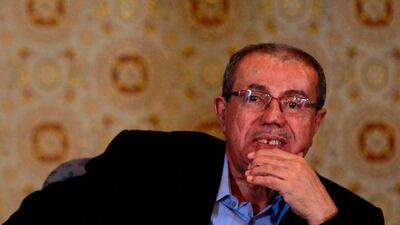Leaders of General People's Congress Party in Yemen's rebel-held capital on Sunday announced the election of a successor to Ali Abdullah Saleh, a move that was swiftly rejected by members who fled a rebel crackdown in Sanaa following Saleh's assassination.
The election of deputy leader Sadeq Amin Abou Rass at a meeting of the party general assembly in Sanaa was announced on Twitter by Al Sheikh Hussein Hazeb, a GPC member who served as minister in a ruling council with the Houthi rebels.
Nawra Al Garwi, a member of the GPC assembly who fled to government-controlled Marib province after the Houthis killed Saleh in December, said on Twitter that the meeting in Sanaa "doesn't make any sense" and no longer represented the party.
Kamel Al Khoudani, editor in chief of the Al Mithak newspaper affiliated with the GPC, tweeted that the move by party leaders in Sanaa was a "shame" and a betrayal of the blood of the former Yemeni president, many of whose relatives were arrested by the Houthis.
Mr Abou Rass was appointed GPC deputy leader by Saleh in 2014. The chairman of the Houthi political council, Saleh Al Samad, congratulated him on his election as party leader.
The Iran-backed Houthis, who seized Sanaa in 2014, killed Saleh after he broke his alliance with them and called for talks with the Saudi-led military coalition supporting Yemen's government.
The coalition said on Sunday that one of its jets had crashed due to a technical failure during operations in Yemen but both pilots were rescued unharmed.
Meanwhile, Yemeni security forces in Aden stopped lorry carrying 50 bags of urea nitrate, a fertiliser-based high explosive that can be used in improvised explosive devices, that was travelling to Sanaa on Saturday.
The Saudi-led coalition, which includes the UAE, had found such material in a number of sites in the northern provinces of the country, where the Houthi rebels would assemble explosives and landmines under the leadership of Iranian experts.
"Aden police stopped a big lorry at the Al Areesh checkpoint in the Khormaksar city of Aden [on Saturday] and discovered that its cargo was 50 bags of Urea nitrate, which was covered up with rice to conceal the content inside," Lt Abdulrahman Al Nakeed told The National.
“The driver of the lorry admitted that he was heading with the substance to Sanaa, the capital, which is held by the Houthis.”
Meanwhile, the coalition killed in air strikes “a large number” of Houthi rebels trying to take over the city of Al Khawkhah in Al Hodeida governorate, reported the Saudi Press Agency on Sunday.
The Houthis seized Sanaa in September 2014 and later advanced south, forcing Mr Hadi's government to flee to the second city of Aden and prompting the Saudi-led coalition to intervene in the war the following March.
The conflict has displaced more than two million people, caused a cholera epidemic and pushed the country to the brink of famine. At least 10,000 people have been killed.
_______________
Read more:
Yemen war: Senior Houthi and his fighters surrender to army in Hodeidah
Saudi Arabia intercepts Houthi missile fired at Najran province

